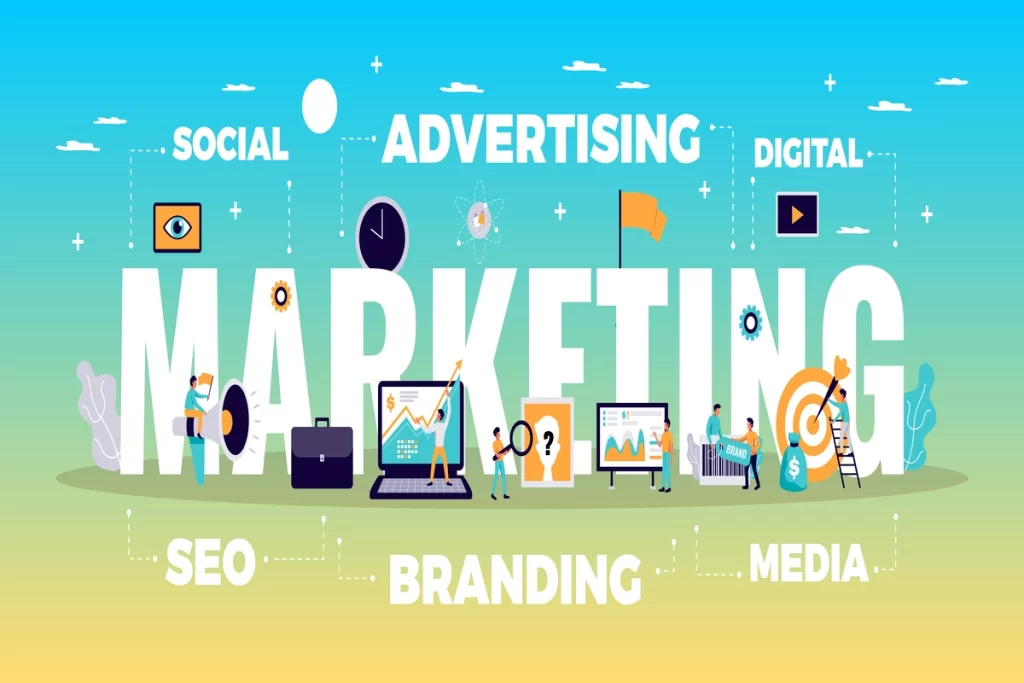Do you know the difference between digital marketing and affiliate marketing? Many people assume that these two types of marketing are the same. However, there are distinct differences between the two.
Digital marketing is a form of advertising that uses various digital channels. Such as websites, social media, search engines, and email, to reach potential customers.
On the other hand, affiliate marketing is an arrangement between a merchant and an affiliate, where the affiliate earns a commission for each successful sale or referral.
This blog post will detail the differences between digital marketing and affiliate marketing.
What is Digital Marketing?
Digital marketing is an umbrella term for all marketing activities. That is conducted through digital channels such as search engines, websites, social media, email, and mobile apps.
It encompasses many strategies and tactics. That includes content marketing, search engine optimization (SEO), pay-per-click (PPC) and display advertising, influencer marketing, and more.
Digital marketing can be used to reach and engage customers in the online world, helping businesses increase their brand visibility and website traffic.
By leveraging the power of the internet, digital marketers can create campaigns. They will create campaigns that have a more significant impact than traditional marketing methods.
Digital marketing allows businesses to target their desired audience more accurately and efficiently than ever before, which is why it is becoming increasingly popular.
What is Affiliate Marketing?
Affiliate marketing is a type of performance-based marketing. In which a business rewards one or more affiliates for each customer or visitor brought by the affiliate’s marketing efforts.
Affiliate marketing is one of the most popular and cost-effective ways to promote a product or service online. It allows you to earn a commission from sales that come from your referrals.
At its core, affiliate marketing involves two parties: the affiliate (also known as the “publisher”) and the merchant (or “advertiser”).
The affiliate promotes the merchant’s products or services in exchange for a commission. The merchant provides tracking tools and payment processing. Also, other resources to help affiliates market their products or services.
The affiliate can use various methods to drive customers or visitors to the merchant’s website. These methods include social media marketing and search engine optimization. Plus, it includes email marketing, content creation, paid search engine advertising, and more.
Affiliate marketing aims to drive as many potential customers to the merchant’s website as possible to purchase products or services.
Affiliates can increase conversions by offering incentives. Such as discounts, cashback, and promotional offers. And ultimately, the revenue for the merchant.
In addition, affiliate marketing helps build trust and loyalty between the merchant and the affiliate. It leads to more sales for both parties.
What are The Key Differences Between Digital Marketing and Affiliate Marketing?
Digital Marketing is a broader term having all marketing domains. At the same time, affiliate marketing is a sub-domain of digital marketing.
In terms of Revenue generation, digital marketers promote their business by having a marketing team.
At the same time, affiliate marketers are outsiders who help businesses to generate more out of it.
The digital marketer needs multiple skill sets. Like, such as SEO, Content writing, ads campaign. At the same time, affiliate marketing is about building customer relationships. It depends on your communication.
Digital marketing involves multiple actions. Like you must become a master in SEO, an analytics tool expert, you need to have a grip on graphics designing. And if not, you need a team to assist you in your marketing journey.
While affiliate marketing is quite simple, you do not need to involve others. You can do it yourself—the only need for an affiliate business and targeted customer.
But one more thing: affiliate marketing isn’t successful without digital marketing. Imagine you’ve got a website as an Amazon affiliate (in-demand business). To get more out of it, you need social media promotion.
At the same time, you have a youtube channel, which you use to promote your products or services. You can use it for amazon affiliates or other affiliate programs.
The most in-demand are domain affiliates. So, it all depends on the rest of your business. I hope you will get the answer.
Which One Should You Choose For Your Business? Digital Marketing or Affiliate Marketing
Both digital marketing and affiliate marketing can be valuable strategies for a business. And the choice between the two will depend on your specific goals and resources.
Digital marketing involves promoting your business through online channels. Such as search engines, social media, email, and other digital platforms.
It can include a variety of tactics, such as search engine optimization (SEO), pay-per-click (PPC) advertising, social media marketing, content marketing, email marketing, and more.
Digital marketing can increase your online visibility, attract more website traffic, generate leads, and drive sales.
Affiliate marketing, on the other hand, is performance-based marketing where you partner with other businesses or individuals (affiliates) to promote your products or services.
You pay these affiliates a commission or a fee for every sale or lead they generate for you. Affiliate marketing can be a cost-effective way to increase your reach and generate more sales, as you only pay for results.
In general, digital marketing may be a better choice if you want to build your brand, increase your online presence, and drive traffic to your website.
On the other hand, affiliate marketing can be a good choice if you want to generate more sales or leads and have a network of partners who can help you promote your products or services.
Ultimately, the best strategy will depend on your goals, budget, and resources. Many businesses use a combination of digital marketing and affiliate marketing to achieve their goals.
It’s essential to evaluate your options carefully and choose the strategy that best aligns with your business objectives.
Here are The Top Reasons Why Affiliate Marketing is Best for Small Businesses:
Affiliate marketing campaigns are less costly and daunting than other marketing efforts.
Affiliate marketing is a fantastic strategy for businesses to increase sales. All of this ultimate revenue before going to last.
Take a look at these stats:
Affiliate marketing market value:
By 2023, affiliate marketing will have a market value of $17 billion.
Many more businesses are going to explore nano- and micro-affiliate marketers. Who collabs with them as affiliate marketing? And they depend on them.
Affiliate marketing is going to become a multi-billion dollar industry.
Statista says the industry has rapidly grown over the last ten years.
90% of customers trust affiliate marketing.
In B2C businesses, there are 81.4% of affiliate partners.
Whilst the other 18.6% put their efforts into B2B services.
Small businesses work on tight margins. The staff of small companies is often limited. So, here they prefer affiliate marketing.
Here are some top reasons why affiliate marketing is helpful for small businesses:
Provides Social Proof:
2.64 billion online shoppers worldwide, 33.3% of the total population.
So they search online about brands; they review products and see what people say about them. And those who have substantial social influence beat their competitors.
Here, affiliate marketing goes up. Small businesses make 10X more with affiliate marketing.
Expands Audience:
Affiliate marketing allows customers to interact with them and learn about brands. Affiliate marketers already have a wide presence.
Much of your audience knows about them; follow them. Also, many customers look to their online personalities for recommendations.
Interacting with a new audience or recognizing a new brand or business may be difficult and require more effort.
So, here, influencing marketing works amazingly. The new audience becomes an established part of the brand and a unique and potential leader
Higher ROI:
Increase your ROI by collaborating with affiliate marketers. So the more ROI, ROI, and ROI.
Affiliate marketing has a higher ROI than Google ads or any affiliate lead.
Because it is a long-term strategy that works better. Because you’re not paying for each sale. And not per click. So get the benefit.
This strategy generates 20X more sales than other marketing tactics.
✅ And again, it will last a long time.
✅ Higher return-on-investment.
✅ Be happy 🥰 and cool; explore the world.
Build Effective Brand Awareness:
83% of marketers raise their brand recognition by affiliate marketing.
This is how!
How affiliate marketing builds effective brand awareness and recognition?
Any new business can quickly raise its awareness and desire to be recognized globally.
But How?
You can get recognition in the world’s eye through digital marketing and sub-domain affiliate marketing.
It will also build trust and acceptance in the customer’s mind.
Boosts SEO:
Affiliate marketing allows organic SEO boosts. Sharing web content on social media will benefit. It gives a social signal.
Inbound links are more beneficial.
Because every link points back to the business website, it boosts online visibility.
Complete Control:
Marketing with affiliates has become an increasingly popular way for businesses to promote their products or services. One of the great and unique benefits of marketing is the complete control of businesses over their marketing strategies.
Businesses can work closely with affiliates to deliver their marketing message correctly. It means that companies can have complete control over the content created by the affiliate, ensuring that it accurately reflects the values and news of their brand.
To Sum Up!
Businesses can provide affiliates with specific guidelines on promoting their products or services. Ensuring that their message is delivered effectively and authentically.
Affiliates can give businesses complete control over their reputation. By choosing the right companions to work with, companies can ensure their brand is associated with people with a positive reputation and a strong following.
It boosts the credibility and trustworthiness of the business, which can lead to increased sales and customer loyalty.
In conclusion, marketing with affiliates offers businesses complete control over their marketing strategies.
By carefully selecting the correct affiliate, working closely with them to deliver their message, tracking their success, and managing their reputation. Businesses can ensure that their marketing campaigns are effective, authentic, and tailored to their needs.
FAQ’s
Is affiliate marketing better than Digital media marketing (Social media marketing)?
These marketing tactics work on different marketing funnels.
However, our quick view is that Social media marketing is a subdomain of digital marketing. It involves social platforms like Facebook, Linkedin, and Instagram.
But affiliate marketing involves the seller and a single affiliate.
You can use social media marketing if you have an excellent presence.
However, if you’re a good communicator and have the power to convince people, you can become a fantastic affiliate marketer. So, do affiliate marketing instead of social media marketing.
Tip:
- Be calm, and research your niche.
- Keep an eye on your competitors
- Analyze market requirements.
- Do what your business requires.
In which industries do affiliate marketers have a tremendous demand?
The five most appreciated affiliate categories are:
Fashion and apparel: 41%
Electronics: 40%
Accessories: 29 %
Online services: 30%
Beauty niche: 28%
Business market: 25%


